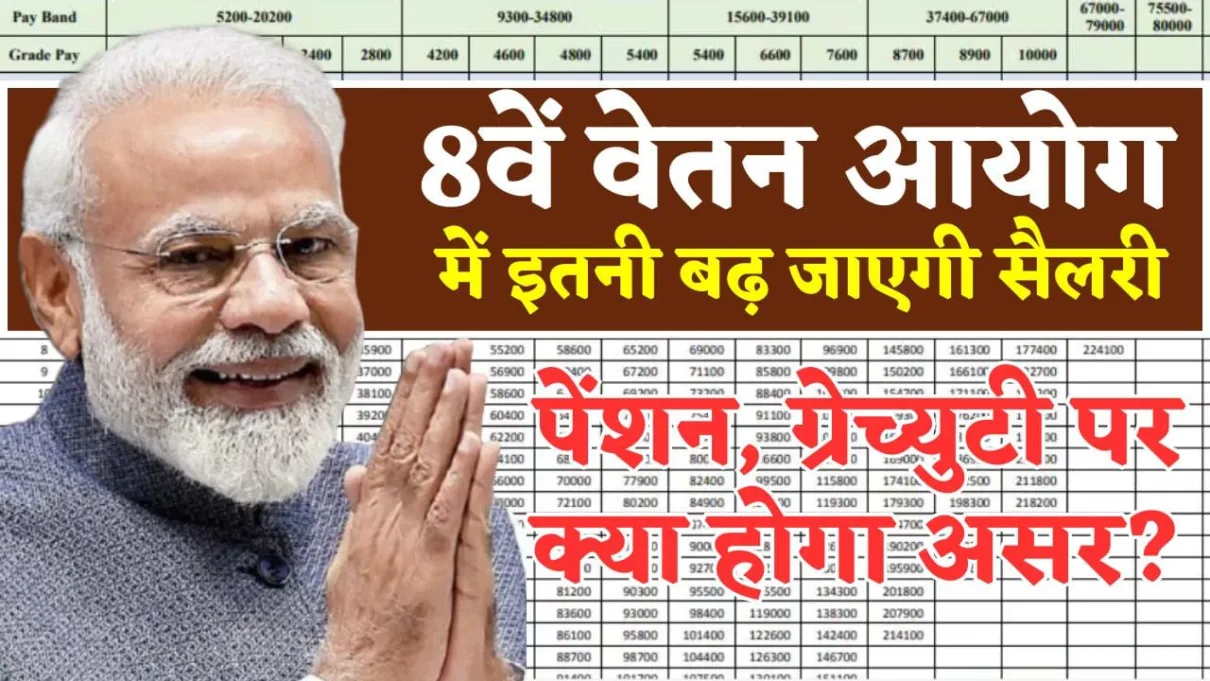8th Pay Commission 2025 Latest News: The Union Cabinet, under the leadership of Prime Minister Narendra Modi, sanctioned the establishment of the 8th Central Pay Commission for central government employees and pensioners on January 16, shortly before the Budget for 2025.
This decision is anticipated to result in a substantial pay increase for central government employees once the recommendations of the new Pay Commission are enacted. This development provides significant relief to over 10 million central government employees and pensioners. The previous UPA administration initiated the 7th Pay Commission in February 2014, which subsequently submitted its report to the government in November 2015.

8th Pay Commission 2025 Latest Update
The recommendations from this commission were implemented starting January 1, 2016, leading to enhanced salaries for central government employees and pensioners. The announcement of the 8th Central Pay Commission has generated considerable enthusiasm among these groups.
Set to commence on January 1, 2026, the 8th CPC is expected to adjust salaries, pensions, and allowances, thereby directly benefiting more than 10 million individuals. With indications of a fitment factor of 2.86, pensioners are likely to experience a notable increase in their monthly pensions. This document outlines the current pension framework, anticipated modifications under the 8th Pay Commission, and the potential implications of these adjustments.
Next Pay Commission’s term begins in January 2026
A significant concern for both employees and pensioners is the timing of the merger of the dearness allowance (DA) into the basic pay, which would reset the DA to zero. Should the commission’s recommendations be received and enacted prior to January 2026, the existing DA, which currently stands at 53%, is likely to be incorporated into the basic pay, with a new DA commencing thereafter.
Two additional DA hikes are anticipated—one in January 2025 and another in July 2025—before the next Pay Commission’s term begins in January 2026. If the implementation of the recommendations is postponed beyond this date, the government may opt to announce another DA increase prior to the merger, leading to retrospective adjustments in salaries and pensions.
NSP OTR Registration 2025 Apply Online By Aadhar Card, Face Authentication at scholarships.gov.in
CM Ladli Behna Yojana 2025: इस दिन मिलेगी 20th क़िस्त, 1250 रु, गैस सिलेंडर का भी लाभ
What will happen to the DA after the 8th Pay Commission’s recommendations?
The 8th Pay Commission’s recommendations will significantly impact two main aspects: the fitment factor, which influences salary adjustments, and the Dearness Allowance (DA) factor. It is anticipated that the government will integrate the DA into the basic pay of employees. If these recommendations are enacted before January 2026, the DA may be reset to zero, meaning the calculation for DA would begin anew.
Under the 7th Central Pay Commission, established in 2016, the minimum basic pension for central government retirees was set at Rs 9,000 monthly, while the maximum pension was limited to Rs 1,25,000 monthly, which is 50% of the highest government salary. Over time, additional benefits like Dearness Relief (DR) have played a crucial role in protecting pensioners from the effects of inflation.
Expectation from 8th Pay Matrix
- The fitment factor serves as a crucial element in determining salary and pension adjustments, functioning as a multiplier for recalibrating pay scales.
- The 7th Central Pay Commission established a fitment factor of 2.57, which resulted in significant increases in both basic salaries and pensions.
- Anticipations for the 8th Pay Commission suggest a proposed fitment factor of 2.86, which is likely to yield considerable enhancements in pension amounts.
- Should this new fitment factor be enacted, the minimum pension, currently set at Rs 9,000, could rise dramatically to approximately Rs 25,740 per month, reflecting an increase of 186 percent.
- The maximum pension, which is presently Rs 1,25,000, is projected to increase proportionately, potentially surpassing Rs 3,57,500 monthly.
- The adjustments to pensions will be further augmented by the application of Dearness Relief (DR).
- The 8th Pay Commission may also propose modifications to various pension-related benefits, including:
- Future Dearness Relief adjustments will be based on the newly revised pension figures.
- There may be an increase in gratuity limits to align with the enhanced salary and pension frameworks.
- Family pensions are expected to be revised in accordance with the overall increases in pension amounts.
- The 8th Pay Commission is poised to provide significant financial advantages to central government pensioners, with the anticipated fitment factor increase leading to over 186 percent growth in pensions.
- This comprehensive restructuring, alongside ongoing adjustments to Dearness Relief and other allowances, is expected to significantly bolster the financial stability and quality of life for retirees.
Social Security Up to $800 Direct Deposit – Eligibility & Payment Dates Explained
Study In UK: Birmingham University Scholarships Apply, Worth Up To £15,000 For Indian Students
FAQs on the 8th Central Pay Commission
What is the 8th Central Pay Commission?
The 8th Central Pay Commission is a body established by the Indian government to review and recommend changes to the salary structure, pensions, and allowances for central government employees and pensioners. Its recommendations are expected to come into effect starting January 1, 2026.
When will the 8th Pay Commission’s recommendations be implemented?
The recommendations are anticipated to be implemented by January 1, 2026. However, if there are delays, further adjustments may be made before then.
What is the expected fitment factor for the 8th Pay Commission?
The 8th Pay Commission is expected to propose a fitment factor of 2.86, which would significantly increase the salaries and pensions of central government employees and pensioners.
How will the Dearness Allowance (DA) change under the 8th Pay Commission?
The DA is likely to be merged into the basic pay, resetting it to zero. The DA would then be recalculated based on the new basic pay from January 2026. There may be additional DA hikes before the implementation.
What will happen to pensions after the 8th Pay Commission’s recommendations?
The minimum pension could increase by 186%, potentially rising from Rs 9,000 to Rs 25,740 per month. Maximum pensions could also rise proportionally, and ongoing adjustments to Dearness Relief (DR) will further enhance pension amounts.
Will family pensions be revised under the 8th Pay Commission?
Yes, family pensions are expected to be revised in line with the overall increases in pension amounts.
How will the 8th Pay Commission affect gratuity limits?
The 8th Pay Commission may propose an increase in gratuity limits to match the higher salary and pension adjustments.
Who will benefit from the 8th Pay Commission’s recommendations?
Over 10 million central government employees and pensioners will benefit from the pay increases, pension enhancements, and other financial adjustments.
When will the DA increase happen before the Pay Commission’s term begins?
Two DA hikes are expected: one in January 2025 and another in July 2025, before the 8th Pay Commission’s recommendations take effect in 2026.

